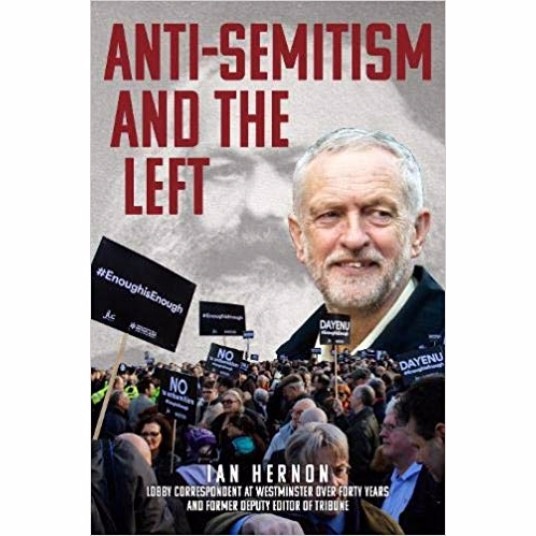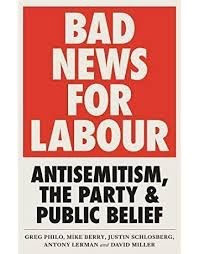
Anti-Semitism and the Left (Amberley) by Ian Hernon
Bad News for Labour (Pluto) by Greg Philo et al
The fact that the Corbyn project is over does not mean that Labour’s anti-Semitism problem is dealt with. It did not begin with the Corbyn leadership – his predecessor Ed Miliband was beset by it – and it will not end with the Corbyn leadership. The new leader has work to do.
Ian Hernon’s book is the third major study of anti-Semitism on the British left in four years and by far the best. Hernon is an experienced political journalist, a former staffer at the left wing magazine Tribune, unmistakably a man of the left who writes with authority about its history. So although Hernon is as unsparing of the left as either of the two previous writers on this subject – Dave Rich and David Hirsh – he is not vulnerable to the charge which has been credibly levelled against them: that they are not willing to hold the right to the same standards as those to which they hold the left. In fact, he writes: “The most virulent ant-Semitism has over the last few years or so come from the far right, the British establishment, the aristocracy and home-grown bigots of all classes.” That makes left wing anti-Semitism even more unforgiveable, for it is a betrayal of the equality for which socialists ought to stand.
By contrast, David Hirsh seemed puzzled and distressed by Labour’s progress leftwards. “There is a rich and exciting fantasy” he wrote “that Corbyn can sweep to power with his new radicalism.” But “if Labour cannot win with an Ed Miliband, and it has lost interest in winning with a Tony Blair, then perhaps it is ready to lose courageously and honestly with a Jeremy Corbyn.” This is a respectable, though controversial, political analysis, but what is it doing in a book called Contemporary Left Anti-Semitism? Its presence there feeds the illusion, still current on the left, that accusations of left wing anti-Semitism can be dismissed as a plot against Corbynism.
The editor of the Jewish Chronicle, Stephen Pollard, feeds this notion regularly. Pollard is a man of strongly conservative views which he expresses trenchantly in right-wing newspapers. Here he is in the Daily Mail, celebrating Labour’s 2015 election defeat: “Even the union barons’ darling, doe-eyed Andy Burnham – who has spent the past five years trotting out left-wing platitudes about greedy capitalists and asserting his knee-jerk hostility to the private sector at every given opportunity – is now saying how big a fan he is of business.” This provides perhaps some context for Pollard’s description of Labour as “a party of bigots and thugs.”
When Ed Miliband was Labour leader, the Daily Mail ran a stunning attack on his distinguished late father Professor Ralph Miliband, a Jewish socialist who fled to Britain from Belgium to escape the Nazis. It is full of sneering references to his immigrant status in Britain and lack of British-ness. The Board of Deputies of British Jews, which has been unsparing about Corbyn, considered sending a mild protest to the editor and decided against.
You can see why the Corbynistas think it’s all a Tory plot. But it isn’t, and Ian Hernon proves it. He shows that left wing anti-Semitism has deep roots and a long history. Karl Marx himself wrote: “What is the worldly religion of the Jew? Huckstering. What is his worldly God? Money.” Keir Hardie wrote in 1900 about “half a dozen financial houses, many of them Jewish, to whom politics is a counter in the game of buying and selling securities.”
Labour’s first Prime Minister Ramsay Macdonald seems to have been an odd mixture of Zionist and anti-Semite, contrasting Jewish settlers in Palestine, whom he admired, with “the rich plutocratic Jew…whose views upon life make one anti-Semitic…He is the keenest of brains and the bluntest of consciences. He detests Zionism because it revives the idealism of his race…”
Left wing anti-Semitism focuses on supposed Jewish control of international finance, and also – since the 1917 Balfour Declaration – on Palestine. It’s not inherent in Labour politics, but it’s something Labour leaders have to be watchful for.

I understand this perhaps more than most. My late father John Beckett, who rightly gets rather more than a walk-on part in Hernon’s narrative, began his political life on the left, just after the end of the first world war. Like many ex-soldiers in 1918, he reserved his bitterest loathing for the war profiteers – the men who had made money out of armaments – and came to identify them as Jews. This helped take him to the far left of British politics, and eventually to Parliament as a Labour MP from 1924 until 1931.
Despairing of the Labour Party, in 1933 he joined Sir Oswald Mosley’s British Union of Fascists. There, the dim-witted major generals and right honourables who attached themselves to Mosley grafted onto my father’s left wing anti-Semitism their own right wing anti-Semitism. The two coalesced in my father’s energetic but impressionable mind, to form a toxic mix which poisoned his thinking for the rest of his life. In the 1930s it was certainly the right where anti-Semitism flourished. In 1938 Conservative MP Robert Tatton Bower shouted at Jewish Labour MP Manny Shinwell: “Go back to Poland.” Shinwell punched Bower in the face.
Anti-Semitism was behind the firing of Leslie Hore-Belisha as war minister in 1939. Collin Brooks, editor of Rothermere’s News Chronicle, wrote in his diary of how much the military top brass disliked “this pushing Jew-boy”, and how, when Hore-Belisha visited the front, they hid from him the fact that they had a proper lavatory, so that he had to “excrete in extreme discomfort.”
The spiritual home of anti-Semitism is on the right, not the left, and Hernon is at his best when telling the sad story of how it came to be identified with Jeremy Corbyn’s Labour Party. It would not have been so if Jeremy Corbyn had engaged with the issue. He held one meeting with the Board of Deputies during his leadership. Corbyn sat in silence throughout while his communications chief Seumas Milne ranted about Israel. Which helps explain why, as Greg Philo and his colleagues in the Glasgow Media Group report in Bad News for Labour, between 25% and 40% of the respondents in a poll believed that a third of Labour Party members had been reported for antisemitism. The real figure was far less than one per cent.
In December last year, Labour went down to its worst defeat since 1935. Jeremy Corbyn is said to have told colleagues that this was all down to “the mainstream media”, but Philo does not take this easy way out. Though sympathetic to Corbyn, and deeply distrustful of the media which they have studied for decades, the Glasgow Media Group understands that the Corbyn response fell several hundred miles short of adequate. “The Labour leadership lived constantly in the hope that a line could be drawn under the crisis” they write.
That’s putting it mildly. I contacted Corbyn’s office about the chapter on anti-Semitism in my book on Corbyn. None of my questions were answered. Instead, there was a cross phone call from Seumas Milne to my co-author Mark Seddon, complaining that we were mentioning the subject at all.

